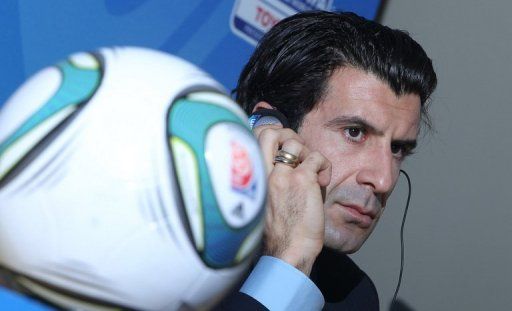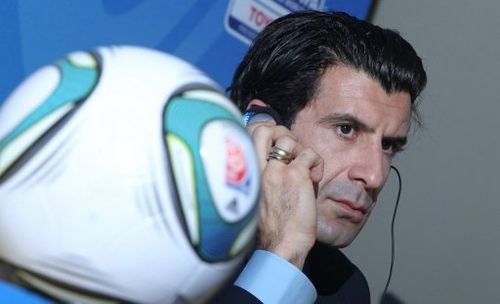
Racism not a football problem: Luis Figo
NEW YORK (AFP) –

Racism is not a football problem, but a wider social ill, Portuguese star soccer player Luis Figo, pictured in 2010, told AFP on Wednesday, in the wake of a succession of racial abuse scandals across European soccer.
Racism is not a football problem, but a wider social ill, Portuguese star soccer player Luis Figo told AFP on Wednesday, in the wake of a succession of racial abuse scandals across European soccer.
Figo, in New York to promote Inter Milan‘s charity work with youngsters in trouble areas around the world, said the club’s initiative showed how “football has a responsibility.” The project, called Inter Campus, teaches football to 10,000 children in 25 countries.
But despite a stream of accusations of racism involving European fans, players and even a referee recently, Figo said the sport is not at fault.
“It’s not a problem of football,” said Figo, a retired midfielder for Barcelona, Real Madrid and Inter, as well as former linchpin of his Portuguese national side.
“It’s like everything. In a stadium of so much people, you always find some part (that) are not so intelligent. I think it’s a problem of our society, it’s not a problem of only football,” he said at the offices of the Italian ambassador to the United Nations, who is also a backer of the Inter Campus initiative.
Among the embarrassing rows to afflict the sport has been Chelsea captain John Terry’s four-game domestic ban for racist comments at QPR defender Anton Ferdinand during a match last year.
But Figo said that even if elements of the crowds might have a racism problem, the players do not — although they might say the wrong thing in the heat of the moment.
“Sometimes it can happen during the game that you are more burning with some situation and you probably tell things you’re not thinking about,” he said.
“But I don’t think that the football players think about that because all that career you are (with) blacks” and other races, he said.
Figo said that the Inter Campus program, with projects everywhere from Angola to Venezuela, demonstrates professional football’s better nature.
“Football has to have causes and fight for the integration of people and give them the opportunity of a future,” he said. The sport can teach disadvantaged youngsters “how you play like a team, in terms of education, school, in terms of family. More than anything, you see a smile in the face of the kids.”
Put on the spot about the sport’s hottest debate of all — who’s greater: former French star Zinadine Zidane or today’s Barcelona wizard and Argentina captain Lionel Messi? — Figo said he couldn’t choose.
“They are totally different football players. For me it’s very hard to choose one,” he said.
However he hinted at Zidane’s greater stature when he noted that just a few years ago the pool of players to consider was bigger.
“The biggest difference you find now is that in this generation you probably have just four or five that you can choose. In the generation of Zidane, or probably before…, if you count you find 20 or 25 greatest football players.”